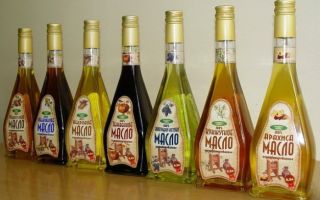Content
- 1 Methods for obtaining vegetable oils
- 2 What is included in vegetable oils
- 3 The benefits of vegetable oils for the body
- 4 Types of vegetable oils and their properties
- 5 What vegetable oils can you give your child
- 6 Vegetable oils for weight loss
- 7 The benefits and harms of vegetable oil on an empty stomach
- 8 Daily consumption rate
- 9 Treatment with vegetable oils
- 10 The use of vegetable oils in cosmetology
- 11 Vegetable oils for massage
- 12 Harm of vegetable oils and contraindications
- 13 How to choose and store vegetable oils
- 14 Conclusion
The benefits and harms of vegetable oil have long been of interest to pharmacists, doctors and nutritionists. Without it, one cannot imagine a daily diet, its use has become so firmly established in our life. We will talk further about what vegetable fats carry for human health.
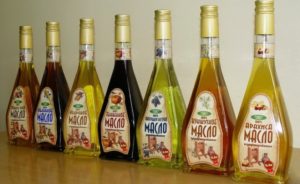
Methods for obtaining vegetable oils
Vegetable oil can be extracted from seeds (fruits) using various technologies, one of which is cold pressing. This method gives less quantity of the finished product than the others, therefore it is mainly used in small industries.
Its advantage is that only the best quality raw materials are used here, therefore there are more useful substances. The seeds pass through a low-power press, inside which the temperature does not exceed +40 oC. Hence the name: cold pressed. It turns out that the oil is not exposed to either temperature or chemistry, so it has more benefits than others. It is defended, passed through filters, packaged.
For large-scale production, powerful high-speed presses are used, various solvents that are harmful to human health. Extraction is the name of an inexpensive chemical method. The cleaned crushed seeds are treated with gasoline or other solvents. Then the oil, mixed with gasoline, goes through several stages of purification with carbon dioxide and various chemicals. It is clear that such technological processing harms the useful properties of the manufactured product.
What is included in vegetable oils
Vegetable oils contain many important nutrients. Some of them are unsaturated fatty acids, which can be:
- polyunsaturated (PUFA): are of great benefit, enhancing metabolism, immune protection, participating in the production of hormones, but they enter the body only from the outside, along with food;
- monounsaturated (PUFA): reduce the concentration of cholesterol, the excess of which leads to stone formation in the biliary tract, the accumulation of sclerotic plaques on the walls of blood vessels. They are produced in small quantities by the body. The most well-known benefit of oleic acid, the content of which is the leader in olive oil.
Unsaturated fatty acids are of great benefit to the body - they are a kind of building blocks for the construction of new cells that should be in the diet every day. They are also needed to support the nervous system, accelerate fat burning processes, strengthen cell walls, help in the fight against pathogenic microbes, viruses, and neutralize environmental harm. If they are not enough, many biochemical processes will be disrupted: from failures in the work of the immune system to deterioration of the condition of the skin.
Two tablespoons of sunflower oil contains the daily dose of vitamin E: in medical language - tocopherol. It is a fat-soluble antioxidant (antioxidant) with unique benefits. Vitamin E has many important functions:
- serves as a rejuvenating agent, which is often used in cosmetics, is recommended for women to preserve their appearance, youth;
- enriches the blood with oxygen: if the vitamin is not enough, the person begins to experience oxygen starvation and gets tired quickly;
- a lot others.
Usually doctors prescribe vitamin E in capsules, but it is better to use it as part of unrefined vegetable oil, adding it to salads. Most vegetables contain fat-soluble vitamins, so there is a mutual enrichment from their combined use with oils.
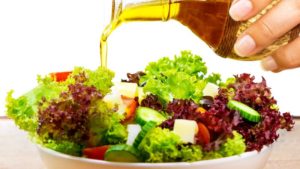
The benefits of vegetable oils for the body
Unrefined vegetable oil can help with the first symptoms of a cold. Heat compresses, drops from the common cold, rubbing agents are made from it. This product has wound healing properties. The benefits of vegetable oils for the human body depend on the composition, respectively, the characteristics will also be different:
- unrefined sunflower: helps with anemia, colds, inflammation in the mouth, intestines, arthritis, gynecological problems, serves as the prevention of atherosclerosis;
- olive: treats osteoporosis, diseases of the biliary tract, liver, gastrointestinal tract, and is also recommended for diabetes mellitus, as a wound healing agent. It is considered the most useful vegetable oil for women, it is widely used in cosmetology;
- soy refined: used to enhance metabolic processes, with pathologies of the kidneys and nervous system, as well as in gynecology;
- corn unrefined: is a part of diets for diabetics, patients with bronchial asthma, used to prevent atherosclerosis, treatment of the central nervous system, kidneys, recommended for pregnant lactating women, children;
- peanut: it is necessary to maintain hematopoietic processes, the functionality of the endocrine system, has anti-cancer activity, is used for pathologies of the bile and liver;
- pumpkin: the most useful vegetable oil for men - used for adenoma and prostatitis, as well as anemia and varicose veins, diseases of the urinary, respiratory, digestive tract, has an antihelminthic and fungal effect;
- linseed: nourishes brain cells, treats blood pressure, thyroid gland, central nervous system, allergies;
- walnut: it is introduced into nutrition with weak immunity, diabetes, hypertension, kidney disease, cardiovascular pathologies, including atherosclerosis;
- Sesame oil: treats pathologies of the respiratory tract, including bronchial asthma, metabolic disorders (gout, diabetes, osteoporosis, goiter), diseases of the urinary system; used in cosmetology.
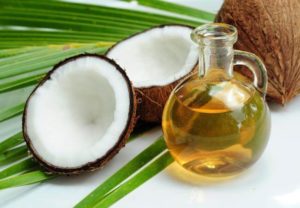
Types of vegetable oils and their properties
Vegetable oils can be classified according to several criteria at once: according to raw materials and production method. That is, sunflower, olive, cottonseed, corn and others are one type of classification. By the degree of purification, this is another way of classification: here all vegetable fats can be divided into three main groups:
- Raw: retain most of the useful properties. After spinning, they are only filtered;
- Unrefined: After filtration, hydration (saturation with water to remove plant phospholipids, which can cloud the oil) and neutralization. Less useful and less nutritious, but better stored
- Refined: are deodorized and frozen, undergo complete technological cleaning.

What vegetable oils can you give your child
Healthy vegetable oils are also recommended for children. They contain the nutrients necessary for growth and development. For example, refined soybean serves as a substitute for fish oil, and sesame seeds - as a rich source of calcium. It also benefits children with corn, pumpkin, and flaxseed oil. They need to be added to ready-made cereals, salads, vegetable purees, soups.
The beneficial properties of vegetable oils are also applied externally, for compresses and rubbing during colds, bronchitis. In childhood, they are used to make drops from a cold, heal wounds, cuts.
Vegetable oils for weight loss
Nutritionists do not advise cutting vegetable fats to a minimum in the diet, since their benefits are irreplaceable from other foods. Otherwise, the symptoms of unhealthy weight loss will be pale skin, loss of elasticity, lack of shine on the hair. However, you shouldn't abuse it either. Without harm to appearance, but with health benefits, you can use 50 g per day.
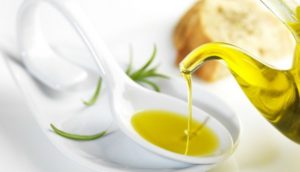
The benefits and harms of vegetable oil on an empty stomach
If you take vegetable oil in the morning on an empty stomach, the benefits increase significantly. Nutrients are absorbed more fully, since their therapeutic effect is stronger:
- vessels are cleared from cholesterol layers;
- bile secretion improves;
- the risks of oncology are reduced;
- slags go away;
- metabolism improves;
- appetite is normalized (downward);
- the liver and lungs are cleared.
But before starting treatment, you need to make sure that there is no gallstone disease, exacerbations of gastrointestinal ulcer pathology. In both of these cases, oil is contraindicated, as it can lead to an attack or other harm.
Daily consumption rate
Eating large amounts of vegetable oil, even the most beneficial for the body, puts a strain on the liver, stomach and other digestive organs. The blow can be strong, capable of harming a person and causing the development of various pathologies, including gastritis, pancreatitis, cholecystitis. Therefore, the daily dose of vegetable fat, which is beneficial to health, should fluctuate between 30-50 g per day.
Treatment with vegetable oils
In folk medicine, cold-pressed vegetable oil is mainly used for treatment - it has a maximum of useful properties. The therapeutic orientation depends on the composition of the raw materials and the preparation technology. The most popular oils in folk medicine are:
- sea buckthorn;
- linseed;
- olive;
- others.
Health benefits of vegetable oils are widely used. They are used internally, externally, as a basis for the preparation of oil extracts of plants, for inhalation.

The use of vegetable oils in cosmetology
Vegetable oils are widely used both in home care and in the cosmetic industry. The beneficial substances contained in them have a healing and rejuvenating effect on the skin, hair, and nail plates.
For facial skin care
Home remedies are often used for daily grooming. The rating of vegetable oils for beneficial properties for the face is as follows:
- olive (cleanses, rejuvenates);
- almond (nourishes, moisturizes);
- peach pits (moisturizes, relieves irritation);
- apricot pits (relieves inflammation, flaking);
- jojoba (moisturizes, nourishes, eliminates rashes);
- coconut (rejuvenates, maintains water balance);
- argan (useful for dry type);
- sea buckthorn (eliminates wrinkles, age spots, acne).
The healing properties of vegetable oils provide effective care for the appearance, benefit not only from the outside, but also from the inside.

For the beauty and health of hair
In order to strengthen and restore hair health, it is also customary to use various vegetable oils. The list includes:
- burdock (relieves dryness under the scalp, strengthens, accelerates hair growth);
- Shea butter (gives shine, silkiness, protects from ultraviolet radiation);
- olive (gives elasticity, prevents cutting, brittleness);
- jojoba (gives strength, shine);
- castor (strengthens, stimulates growth);
- coconut (moisturizes, gives volume, shine);
- argan (restores, gives shine).
For nails
In case of fragility of the nail plates, to improve the appearance and condition, useful substances contained in vegetable oil are used: almond, apricot, peach, sesame, cedar. And in order to also accelerate growth, they use burdock, castor, olive. Wellness procedures are carried out in several ways:
- immerse nails in oil for 5 to 10 minutes;
- apply with a brush for 15 minutes;
- before going to bed, grease and put on gloves.
To restore damaged nail plates, treatment is carried out several times a week, for prevention - once.
For eyelashes, eyebrows and lips
The most commonly used vegetable oils for the care of eyelashes and eyebrows are castor, olive, almond, peach. Can be used for both nourishment and make-up cleansing. For maintenance and growth, apply several times a week. The benefits of the procedures will be noticeable after the first treatment sessions, and in a month the eyelashes will become fluffy, the eyebrows - more well-groomed.
The skin on the lips is thin, delicate, and requires care, especially in the cold season. Vegetable oils nourish, moisturize and heal. Almond, cocoa, coconut, avocado, wheat germ are used.
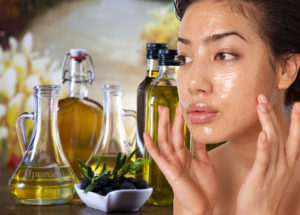
Vegetable oils for massage
The healing composition makes vegetable oils indispensable for a wellness massage or self-massage session. The benefits of such procedures are essential for a fading appearance. The skin is moisturized, softened, nourished, metabolic processes are normalized. It is especially useful after a bath or sauna. It is necessary to study well the properties of vegetable oils in order to properly formulate mixtures for massage:
- Sesame: can be diluted with corn, mustard (for general massage), can be used alone when rubbing joints. Well removes dryness and flaking, puffiness;
- Mustard: heals wounds, treats fungus, lung diseases, gives elasticity, removes pigmentation;
- Wheat germ: has a lot of fat, but at the same time removes excessive secretion of the sebaceous glands, is more suitable for dry skin type, makes it more elastic;
- Corn: used as a solvent for other types;
- Sunflower oil: low permeability layer, so you need to mix with a little almond or coconut;
- Almond: improves the condition of the central nervous system, stimulates muscle growth, removes edema;
- Olive: a little sticky, so it is better to add to the mixture;
- Coconut: relieves rashes, inflammation, gives muscle tone, relieves emotional stress;
- Palm: suitable for young healthy skin;
- Castor: Used to massage the scalp to stimulate the growth of the scalp.

Harm of vegetable oils and contraindications
Frying destroys all nutrients. Optimum temperature - 160 - 170 oC. Smoke that appears above the surface of boiling vegetable oil signals that the temperature regime is violated, and food prepared in this way will only bring harm. From healthy food turns into toxic, carcinogens are formed, that is, those substances that will lead to tumor formations, exacerbations of cholecystitis, pancreatitis, gastritis, and so on.
Massage with vegetable fat will harm:
- with lesions of internal organs;
- tumors;
- elevated temperature;
- varicose veins;
- furunculosis;
- eczema;
- dermatitis;
- inflammation and bleeding of the skin;
- lymphadenitis, sunburn.
There are practically no contraindications to the use of vegetable fat. The main thing is not to eat too much. Adding no more than two tablespoons per day to dishes will be beneficial.
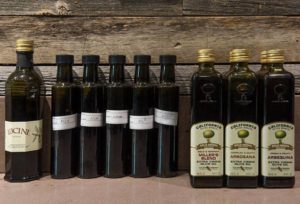
How to choose and store vegetable oils
Choosing bottled oil on the market, it is necessary to choose the highest quality from the whole variety of types. First of all, you need to pay attention to the following points:
- it is undesirable to take oil in plastic bottles from sweet drinks. Various dyes and flavors are added to them, which are not so easy to wash out and are harmful. Such a bottle must be washed for at least ten minutes, which, of course, none of the sellers will do;
- the bottle must be free of scratches, otherwise it will mean that the container is not used for the first time;
- trade should take place indoors or under a canopy so that direct sunlight does not fall;
- cold-pressed oil is light and has the smell of seeds: it is most useful with a shelf life of one month;
- there should be no sediment: it is, as a rule, crushed husk, other garbage, which may not have the most useful properties;
- the absence of bitterness will speak in favor of the selected product;
- oil stored in a darkened glass butyl, new plastic bottles with a sealed lid, or a clean stainless steel can is preferred;
- you need to try and buy goods from the same container in order to prevent substitution with a low-quality analogue.
The best ambient temperature for the preservation of unrefined oil is from +5 to +15 oC. To prolong its freshness, you can add a few dry beans.
Additional information - in the video:
Conclusion
The benefits and harms of vegetable oil depend on many factors that need to be considered when treating and ingesting. These are the raw materials, the way they are processed, as well as the individual characteristics of the patient. It is better to consult a specialist who will help you decide on a treatment regimen.

